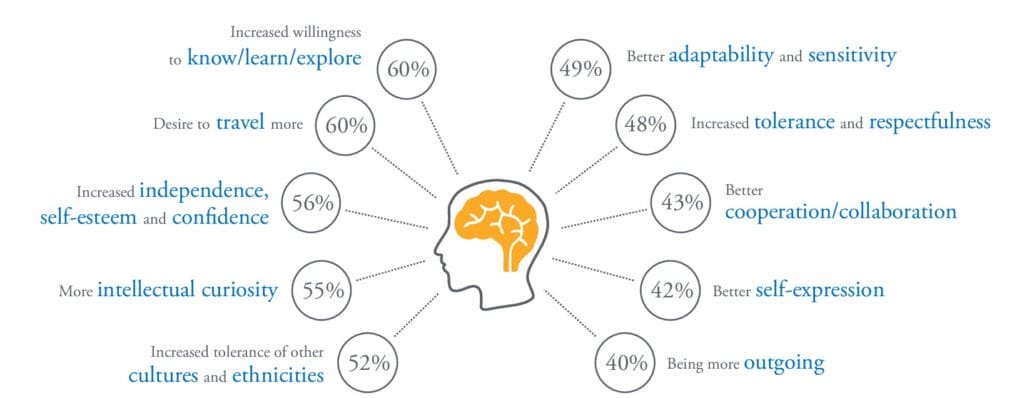Educational travel has been shown to significantly contribute to students’ personal and academic development. According to a study conducted by the Student & Youth Travel Association (SYTA), 56% of educators reported that travel positively influences students’ academic performance and future career prospects.
But what is educational travel? Why do nearly 80% of educators even consider travel an “extremely effective” teaching tool, surpassing computer-based learning.
What Is Educational Travel?
Educational travel, also known as edutourism, combines adventure with structured learning. Unlike conventional trips that focus on leisure, educational travel prioritizes academic enrichment and personal growth.
Programs include guided tours, hands-on activities, and cultural immersion, providing students with unique opportunities to deepen their understanding of academic subjects outside the classroom. This approach fosters curiosity, enhances critical thinking, and inspires a lifelong passion for exploration and education.
For instance, EduTravel’s “Earth and Space Science” program in Iceland allows students to witness the Northern Lights, study geothermal pools, and tour the Perlan Museum, making complex science concepts tangible.
Similarly, the “Canadian History” trip immerses students in the rich history of France and Belgium, visiting battlefields and memorials to connect lessons from the classroom with real historical sites.
These experiences go beyond sightseeing. They are structured to include interactive activities like hands-on experiments, cultural workshops, and discussions with local experts. For example, the “Biology in Fiji” trip combines lessons on marine ecosystems with snorkeling and conservation projects.
Each trip is carefully curated to support specific learning objectives while also nurturing students’ personal development, independence, and global awareness.
What Are the Benefits of Educational Travel?

Source: SYTA
Educational travel offers numerous benefits that go beyond traditional classroom learning. By stepping outside of the school environment, students gain firsthand knowledge and a deeper understanding of academic concepts. Beyond academics, these trips foster personal growth.
Enhanced academic learning – Educational travel bridges the gap between theory and practice, providing students with concrete experiences that reinforce classroom lessons and deepen understanding.
Cultural exposure and global awareness – Immersing in different cultures helps students develop a broader worldview and appreciate diverse perspectives, which is crucial for becoming a well-rounded global citizen.
Personal development – Traveling independently encourages self-discovery, adaptability, and problem-solving skills—traits essential for both personal and academic success.
Social bonding and teamwork – Shared travel experiences foster friendships and build strong connections among peers, enhancing teamwork and communication skills.
Career and college aspirations – Exposure to diverse fields and real-world applications of academic knowledge can shape future career interests and motivate students to pursue higher education.
Memorable experiences – Educational travel creates unforgettable experiences, leaving students with lasting memories that inspire a lifelong love for learning and exploration.
What Is Educational Travel for Credit?
Educational Travel for Credit is a unique program that enables high school students to earn academic credits while exploring new destinations and experiencing hands-on learning. These trips blend classroom instruction with real-world application, covering subjects like science, history, and the arts.
Credits earned are recognized by educational institutions, making this an innovative way to enhance learning outside the traditional school setting.
For example, EduTravel’s academic credits are recognized by Ontario high schools and are applied towards students’ Ontario Secondary School Diplomas (OSSD). For example, students who participate in a travel program like “Art History in Europe” earn high school credits equivalent to taking the course at their local school, making it a valuable option for students looking to fulfill academic requirements while experiencing immersive learning abroad.
This allows students to graduate on time or even get ahead in their studies while exploring new destinations.
Make Learning Fun With Educational Travel for Credit
If you’re looking for opportunities that combine education with exploration, check out our March Break, Summer, and August programs designed specifically for students.
We also collaborate directly with schools to create customized travel experiences, ensuring each trip aligns with your educational goals and standards. Ready to start planning?
Explore our programs and see how educational travel can transform the way students learn.
The post What Is Educational Travel? (and How You Can Earn High School Credit) appeared first on EduTravel.
Article source: https://edutravelforcredit.com/what-is-educational-travel/

